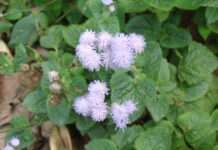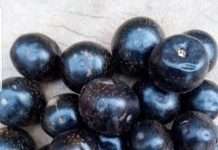
Jatropha tanjorensis Ellis & Saroja (Fam – Euphorbiaceae) is a leafy vegetable native to Mexico that is now commonly grown in the southern part of Nigeria. It is extensively grown in West Africa, where it forms an integral part of their traditional medicine. In Nigeria, it is called efo Iyana Ipaja or ewe lapalapa in Yoruba and ugu oyibo in Igbo.
Common names of the plant include Catholic vegetable, reverend father vegetable, blood of Jesus, ogwu obara, chaya leaf, Jatropha, miracle leaf, tree spinach, God’s gift, and “hospital too far”.
Constituents
Proximate analysis show the presence of carbohydrate, fat, protein, fibre. Phytomemicals like alkaloids, flavonoids, tannins, cardiac glycosides, anthraquinones and saponins are present in the plant, as well as vitamins B1, B2, B3, C and E. Also present are minerals alike magnesium, calcium, sodium, potassium, phosphorus, iron zinc and selenium.
Other constituents are phytate, hydrogen cyanide, jathrophin, Friedelin, β-amyrin, stigmasterol and R(+)4-hydroxypyrrolidinone
Preparations
Leaves may be chewed raw, boiled or used to prepare soup, stew or other meals. J.tanjorensis may be available as the stems, dry leaves or dry leaf powder. It may also be used as infusions.
Pharmacological actions and medicinal uses
Pharmacological studies revealed that the plant showed some wide range of biological activities, such as antihypertensive, antioxidant, antimicrobial, antimalarial, antiparasitic, antioxidant, hypoglycaemic, hypolipidemic and hematological activities. Iron helps in the formation of red blood cells; vitamin C aids the absorption of iron; while dietary fibre aids in the reduction of plasma cholesterol levels.
It is believed that hospital too far improves blood flow by promoting dilatation and relaxation of arteries. It contains potassium, a mineral that also assists in regulation of a normal blood pressure. Similarly, hospital too far contains reasonable amounts of flavonoid, an antioxidant known for maintenance of arteries and veins to improve blood circulation.
It is said that hospital too far can effectively reduce colon and rectal cancer because of the dietary fibre it contains. Hospital too far leaf may help to eliminate factors causing muscular degeneration and symptoms attributed to eye defect because it contains essential amount of vitamins A, C and B complex, as well as bioactive compounds. The anti-inflammatory properties enable it to mitigate pains in the body.
Jatropha is said to be beneficial to dental health. The twigs may be effective against toothaches, while the bark paste can be used to treat gum swelling. Chewing the leaves can help alleviate pyorrhea. Chewing the leaves uncooked would accelerate digestion, making waste elimination simpler, thus its usefulness in constipation.
A study revealed that intake of J.tanjorensis was effective in boosting female reproductive health, pregnancy health and outcome in virgin female Wistar rats.
Ethnobotanical survey in Mubu, Adamawa State, showed that, J. tanjorensis was used as a remedy to diseases such as: measles, scabies, malaria, high blood pressure, stomach ache, diabetes mellitus, eczema and anaemia with majority of the respondents mentioning leaves as part mostly used.
Adverse effects
Consumption of J. tanjorensis may lead to disruption of protein metabolism function of the liver and also negative interference with the filtration capacity of the kidney, which might result in renal and hepatic dysfunction.
Economic uses and potentials
Many useful products come from the plant, especially the seed, from which oil can be extracted. This oil can be used as a feed stock and biodiesel. The extracted oil is useful in making soap, glue, dye, among others. The leaves of J.tanjorensis can be used as a growth promoter in poultry feeds. There are potentials in the cultivation, processing and distribution of J. tanjorensis in the agricultural, pharmaceutical and cosmetics industries.
References
Falodun A., Udu-Cosi A.A., Erharuyi O. Imieje V. (2013). Jatropha tanjorensis – Review of Phytochemistry, Pharmacology and Pharmacotherapy. Journal of Pharmaceutical and Allied Sciences 10 (3) (2013) 1955 – 1964.
By Pharm. Ngozika Okoye MSc, MPH, FPCPharm
(Nigeria Natural Medicine Development Agency)
Email: ngozikaokoye@yahoo.com














I found your articles very useful.Good one 🙏
I found your articles useful.Your doing well.God bless you 🙏